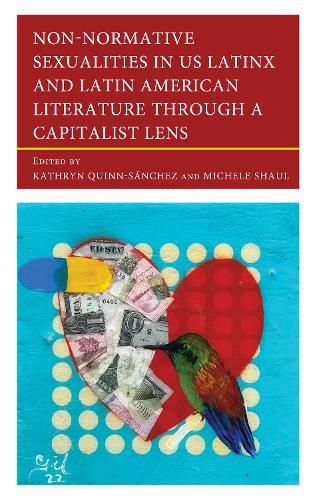Readings Newsletter
Become a Readings Member to make your shopping experience even easier.
Sign in or sign up for free!
You’re not far away from qualifying for FREE standard shipping within Australia
You’ve qualified for FREE standard shipping within Australia
The cart is loading…






Non-Normative Sexualities in US Latinx and Latin American Literature Through a Capitalist Lens studies how Latin American and Latinx authors represent non-normative sexualities through a capitalist lens. In our society, heterosexuality manifests as privilege and has been normalized to such an extent that any sexuality that is perceived as different from the dominant cis-gendered, heteropatriarchal norm is considered deviant. Non-normative sexualities continue to be viewed by society as detrimental to the health of the nation. Consequently, how one is perceived by the dominant culture continues to limit one's ability to thrive. Each chapter serves to analyze how one's perceived gender identity or sexuality can block access to economic opportunity. Queer, trans, spatial and intersectional theories form the base of the literary analyses. One of the contributors' goals is to present capitalism as it is intersectionally present in life, identity, and society. The authors studied in this collection come from the USA, Puerto Rico, Mexico, and the Southern Cone of Latin America.
$9.00 standard shipping within Australia
FREE standard shipping within Australia for orders over $100.00
Express & International shipping calculated at checkout
Non-Normative Sexualities in US Latinx and Latin American Literature Through a Capitalist Lens studies how Latin American and Latinx authors represent non-normative sexualities through a capitalist lens. In our society, heterosexuality manifests as privilege and has been normalized to such an extent that any sexuality that is perceived as different from the dominant cis-gendered, heteropatriarchal norm is considered deviant. Non-normative sexualities continue to be viewed by society as detrimental to the health of the nation. Consequently, how one is perceived by the dominant culture continues to limit one's ability to thrive. Each chapter serves to analyze how one's perceived gender identity or sexuality can block access to economic opportunity. Queer, trans, spatial and intersectional theories form the base of the literary analyses. One of the contributors' goals is to present capitalism as it is intersectionally present in life, identity, and society. The authors studied in this collection come from the USA, Puerto Rico, Mexico, and the Southern Cone of Latin America.